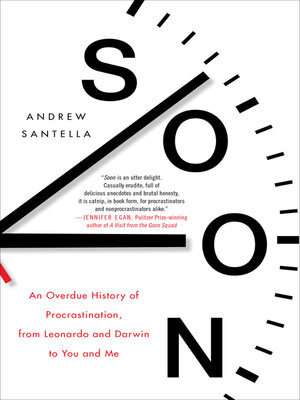Soon
ebook ∣ An Overdue History of Procrastination, from Leonardo and Darwin to You and Me
By Andrew Santella

Sign up to save your library
With an OverDrive account, you can save your favorite libraries for at-a-glance information about availability. Find out more about OverDrive accounts.
Find this title in Libby, the library reading app by OverDrive.



Search for a digital library with this title
Title found at these libraries:
| Loading... |
"Casually erudite, full of delicious anecdotes and brutal honesty, it is catnip, in book form, for procrastinators and non-procrastinators alike." —Jennifer Egan, Pulitzer Prize–winning author
Like so many of us, including most of America's workforce, and nearly two-thirds of all university students, Andrew Santella procrastinates. Concerned about his habit, but not quite ready to give it up, he set out to learn all he could about the human tendency to delay. He studied history's greatest procrastinators to gain insights into human behavior, and also, he writes, to kill time, "research being the best way to avoid real work."
He talked with psychologists, philosophers, and priests. He visited New Orleans' French Quarter, home to a shrine to the patron saint of procrastinators. And at the home of Charles Darwin outside London, he learned why the great naturalist delayed writing his masterwork for more than two decades.
Drawing on an eclectic mix of historical case studies in procrastination—from Leonardo da Vinci to Frank Lloyd Wright, and from Old Testament prophets to Civil War generals—Santella offers a sympathetic take on habitual postponement. He questions our devotion to "the cult of efficiency" and suggests that delay and deferral can help us understand what truly matters to us. Being attentive to our procrastination, Santella writes, means asking, "whether the things the world wants us to do are really worth doing."
"Well-researched . . . [Soon] argues that in many cases eminent figures have done great work while putting off work they were supposed to be doing. Procrastination might, for some people, be part of innovation and the creative process." —The Wall Street Journal
Like so many of us, including most of America's workforce, and nearly two-thirds of all university students, Andrew Santella procrastinates. Concerned about his habit, but not quite ready to give it up, he set out to learn all he could about the human tendency to delay. He studied history's greatest procrastinators to gain insights into human behavior, and also, he writes, to kill time, "research being the best way to avoid real work."
He talked with psychologists, philosophers, and priests. He visited New Orleans' French Quarter, home to a shrine to the patron saint of procrastinators. And at the home of Charles Darwin outside London, he learned why the great naturalist delayed writing his masterwork for more than two decades.
Drawing on an eclectic mix of historical case studies in procrastination—from Leonardo da Vinci to Frank Lloyd Wright, and from Old Testament prophets to Civil War generals—Santella offers a sympathetic take on habitual postponement. He questions our devotion to "the cult of efficiency" and suggests that delay and deferral can help us understand what truly matters to us. Being attentive to our procrastination, Santella writes, means asking, "whether the things the world wants us to do are really worth doing."
"Well-researched . . . [Soon] argues that in many cases eminent figures have done great work while putting off work they were supposed to be doing. Procrastination might, for some people, be part of innovation and the creative process." —The Wall Street Journal






